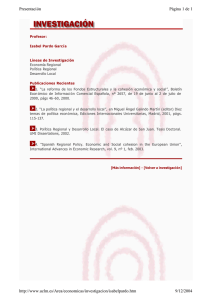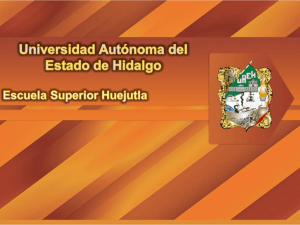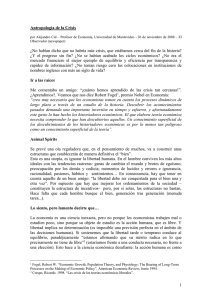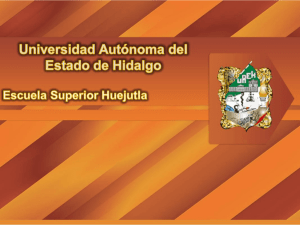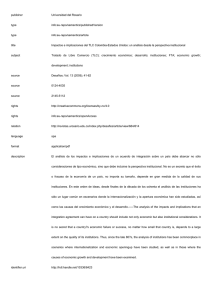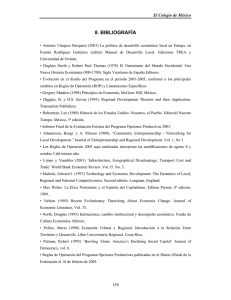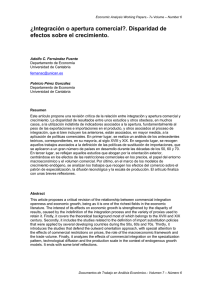SUBJECT 26998 - Economic History of Contemporary Spain
Anuncio
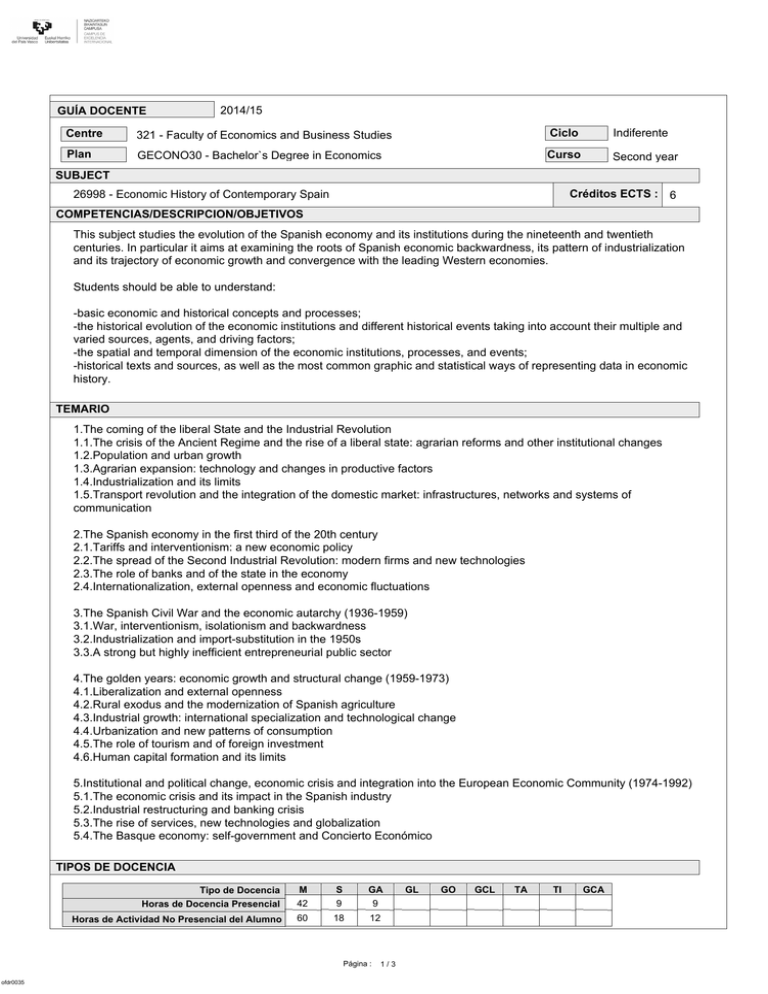
GUÍA DOCENTE 2014/15 Centre 321 - Faculty of Economics and Business Studies Ciclo Indiferente Plan GECONO30 - Bachelor`s Degree in Economics Curso Second year SUBJECT Créditos ECTS : 6 26998 - Economic History of Contemporary Spain COMPETENCIAS/DESCRIPCION/OBJETIVOS This subject studies the evolution of the Spanish economy and its institutions during the nineteenth and twentieth centuries. In particular it aims at examining the roots of Spanish economic backwardness, its pattern of industrialization and its trajectory of economic growth and convergence with the leading Western economies. Students should be able to understand: -basic economic and historical concepts and processes; -the historical evolution of the economic institutions and different historical events taking into account their multiple and varied sources, agents, and driving factors; -the spatial and temporal dimension of the economic institutions, processes, and events; -historical texts and sources, as well as the most common graphic and statistical ways of representing data in economic history. TEMARIO 1.The coming of the liberal State and the Industrial Revolution 1.1.The crisis of the Ancient Regime and the rise of a liberal state: agrarian reforms and other institutional changes 1.2.Population and urban growth 1.3.Agrarian expansion: technology and changes in productive factors 1.4.Industrialization and its limits 1.5.Transport revolution and the integration of the domestic market: infrastructures, networks and systems of communication 2.The Spanish economy in the first third of the 20th century 2.1.Tariffs and interventionism: a new economic policy 2.2.The spread of the Second Industrial Revolution: modern firms and new technologies 2.3.The role of banks and of the state in the economy 2.4.Internationalization, external openness and economic fluctuations 3.The Spanish Civil War and the economic autarchy (1936-1959) 3.1.War, interventionism, isolationism and backwardness 3.2.Industrialization and import-substitution in the 1950s 3.3.A strong but highly inefficient entrepreneurial public sector 4.The golden years: economic growth and structural change (1959-1973) 4.1.Liberalization and external openness 4.2.Rural exodus and the modernization of Spanish agriculture 4.3.Industrial growth: international specialization and technological change 4.4.Urbanization and new patterns of consumption 4.5.The role of tourism and of foreign investment 4.6.Human capital formation and its limits 5.Institutional and political change, economic crisis and integration into the European Economic Community (1974-1992) 5.1.The economic crisis and its impact in the Spanish industry 5.2.Industrial restructuring and banking crisis 5.3.The rise of services, new technologies and globalization 5.4.The Basque economy: self-government and Concierto Económico TIPOS DE DOCENCIA Tipo de Docencia Horas de Docencia Presencial M 42 S 9 GA 9 Horas de Actividad No Presencial del Alumno 60 18 12 Página : ofdr0035 1/3 GL GO GCL TA TI GCA Leyenda: M: Magistral S: Seminario GA: P. de Aula GL: P. Laboratorio GCL: P. Clínicas TA: Taller TI: Taller Ind. GCA: P. de Campo GO: P. Ordenador Aclaraciones : EVALUACION - Examen escrito a desarrollar - Realización de prácticas (ejercicios, casos o problemas) - Trabajos individuales - Trabajos en grupo - Exposición de trabajos, lecturas... Aclaraciones : The assessment is based on different activities that must be undertaken by the student: final written exam, individual and/or team work, written essays on selected readings, practices, and assignment questions. The final grading is the weighted sum of the final written exam (75%), plus the student’s activity in seminars and practices (25%). MATERIALES DE USO OBLIGATORIO BIBLIOGRAFIA Bibliografía básica BARCIELA, C., LÓPEZ ORTIZ, I., MELGAREJO, J., and J. A. MIRANDA (2001), La España de Franco (1939-1975). Economía, Madrid, Síntesis. BERNAL, A. M., and A. PAREJO (2001), La España liberal (1868-1913), Madrid, Síntesis. BRODER, A. (2000), Historia económica de la España contemporánea, Madrid, Alianza. CARRERAS, A., and X. TAFUNELL (2010), Historia económica de la España contemporánea (1789-2009), Barcelona, Crítica. COMÍN, F., HERNÁNDEZ, M., and E. LLOPIS (2003), Historia Económica de España siglos X-XX, Barcelona, Crítica. GERMAN, L., et al. (2000), Historia económica de España. Una perspectiva regional, Barcelona, Crítica. NADAL, J., and CARRERAS, A. (1992), Pautas regionales de la industrialización española (siglos XIX y XX), Barcelona, Ariel. TORTELLA CASARES, G. (1998), El desarrollo de la España contemporánea: historia económica de los siglos XIX y XX, Madrid, Alianza. Bibliografía de profundización CARRERAS, A., and X. TAFUNELL, Estadísticas históricas de España, siglos XIX y XX, Barcelona, Crítica-Fundación BBVA. GARCÍA RUIZ, J. L., and C. MANERA (Coords.), Historia empresarial de España: una perspectiva regional, Madrid, LID Editorial. NADAL, J. (Dir.) (2008), Atlas histórico de la industrialización española, Barcelona, Crítica-Fundación BBVA. NADAL, J., CARRERAS, A., y SUDRIÀ, C. (1987), La economía española en el siglo XX. Una perspectiva histórica, Barcelona, Ariel. PRADOS DE LA ESCOSURA, L. (2005), El progreso económico de España 1800-2000, Bilbao, Fundación BBVA. Revistas Revista de Historia Económica. Journal of Iberian and Latin American Economic History Revista de Historia Industrial Historia Agraria Investigaciones de Historia Económica Direcciones de internet de interés http://www.aehe.net/docencia.html (teaching webpage of the Spanish Association of Economic History, with a lot of interesting material and links to texts, documents, videos and other teaching and learning resources) Página : ofdr0035 2/3 http://www.ine.es http://www.ivie.es (databases on capital stock, human capital and social capital) http://www.rtve.es (podcasts and movies) http://www.rtve.es/filmoteca/ (news and documentaries of the Spanish filmmaking authority, NO-DO, created by the Franco government in 1942) http://www.march.es (audio and mp3 archive of public lectures) Página : ofdr0035 3/3
